11 Best Magento 2 Themes to Make Your Store Standout in 2025
Vinh Jacker | 03-17-2025
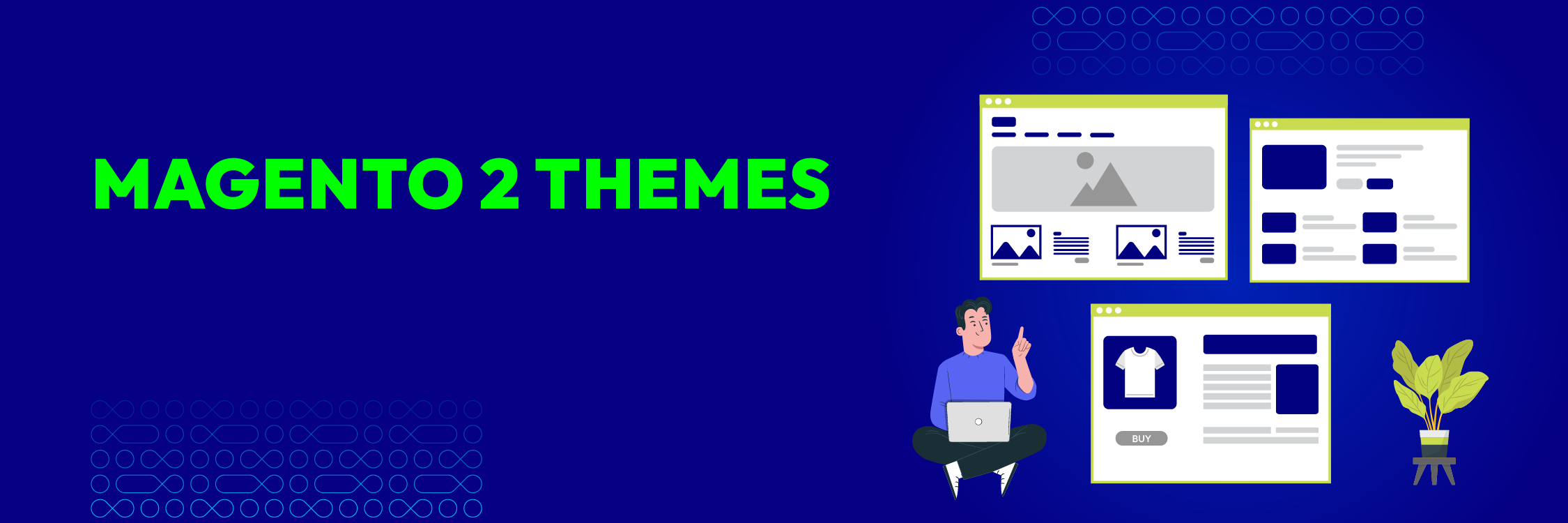
In today’s blog, we will cover the best Magento 2 themes that can make your store much more attractive to customers. These are the 11 trending and best-selling themes in 2025, guarantee to beat your competitors and bring better sales to your business. Let’s start!
Is Magento 2 Theme Necessary?
To answer this question, we first need to know what exactly a Magento 2 theme is.
According to Adobe Developer, a Magento theme is “a component of application which provides a consistent look and feel (visual design) for entire application area (for example, storefront or Admin) using a combination of custom templates, layouts, styles or images.” In short, it decides how your store looks like.
So, why should we install a Magento 2 theme? Is it really necessary?
When running an online business, it’s crucial to focus on the store visual because it’s the only thing customers can feel about the products through their screens. With Magento’s default basic themes - Luma and Blank, your store’s appearance can hardly stand out in such a competitive market.
Of course, you can use a basic theme, but the effectiveness might not match your expectations. Instead, why not consider choosing an advanced theme that can transform your store into an engaging website where all visitors want to stay longer and explore what you have?
How to Choose the Best Magento 2 Themes?
Clearly, value and price are the two most important factors in deciding whether a person is going to buy something. Let’s begin with the key aspects that a good Magento theme should be able to guarantee. Just think of this as a checklist to use before making your purchase.
#1. Business Goals

First of all, think about your business goals. You should choose a theme that can:
- Represent your business ideal
- Meet your audience’s needs
- Have a clear visual hierarchy
For example, if you own a fashion store, you should pick a theme with stunning visuals. However, if yours is a technology website, it should focus more on user experience, and the style should be modern rather than classic or vintage.
#2. User-Friendly
Fast loading times are crucial. In fact, 70% of consumers say page speed affects their buying decisions. They prefer websites with faster loading and easy navigation. So, better consider a theme with a user-friendly interface and standard buttons like search, add-to-cart, and wishlist.
#3. Cross-Browser Compatibility
People don’t just use one type of browser. Choosing a theme that only works with Google Chrome will make you lose potential customers who use other browsers like Safari, Firefox, etc. Ensure your theme is compatible with cross-browsers to prevent visitors from leaving in frustration, especially if you aim to reach a global audience.
#4. SEO-Friendly
SEO is one key to success for e-commerce websites, bringing organic traffic. You should prioritize SEO-friendly themes that allow search engine robots to crawl and index your store more effectively. They can improve site visibility on SERPs (search engine result pages) and acquire more visitors.
The theme should have clear HTML/CSS coding and standard codes for faster indexing. A well-optimized theme, like Magento 2 Hyvä, would currently be the top choice.
#5. Design Elements
Choose a theme that offers essential design features like banners, social media icons, and options for adding blogs and reviews. A complete theme package can enhance your marketing efforts and allow easy social media integration.
#6. Customization Capability
Your theme should be easy to customize so that you can quickly adapt to business needs. You may want to change something when it comes to new seasons, holidays, trends, innovations, and so on. So, look for themes with a “Live Theme Editor” that allows you to make changes without taking your store offline.
#7. Technical Aspects
Look for themes that incorporate the latest technologies like SASS, Bootstrap 3, HTML5, and CSS3. These technologies help ensure your site performs well on all devices, particularly with the rise of mobile commerce.
#8. Multilingual and RTL-Ready
Select a theme that supports multiple languages and currencies to cater to a global audience. This capability ensures your Magento store can expand its reach without limitations.
Now that you understand the essentials of Magento 2 themes, let’s explore the best themes available in the market, categorized into free and paid options for your convenience.
Hottest Magento 2 Themes in 2025
The options below are all affordable, trending in 2025, with a leading number of sales and feedback, and they meet the key criteria mentioned above.
However, each theme has its unique features, so take a look and consider which one is the best fit for you.
1. Hyva
Version: Magento 1
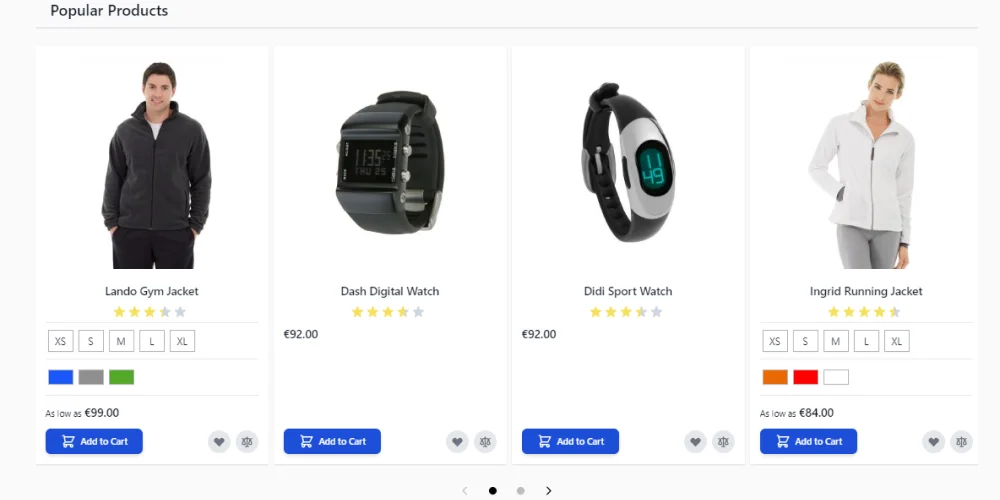
The top Magento theme in today’s list must belong to Hyva. It stands out as the leading option with its lightweight design and exceptional performance. It offers a modern, user-friendly interface and is optimized for speed, making it ideal for e-commerce sites that prioritize a seamless shopping experience.
Key Features:
- Clear code architecture
- Optimized performance
- Intuitive design elements
- Customization flexibility
- Responsive design
- Flexible integration capabilities
Price: €1,000.00 for a license per domain
Since the Hyva theme was released, many stores have migrated from Luma to Hyva. That’s why top Magento extension developers have put in great effort to make their modules compatible with it, and Mageplaza is no exception. Check out our Hyva-compatible extensions!
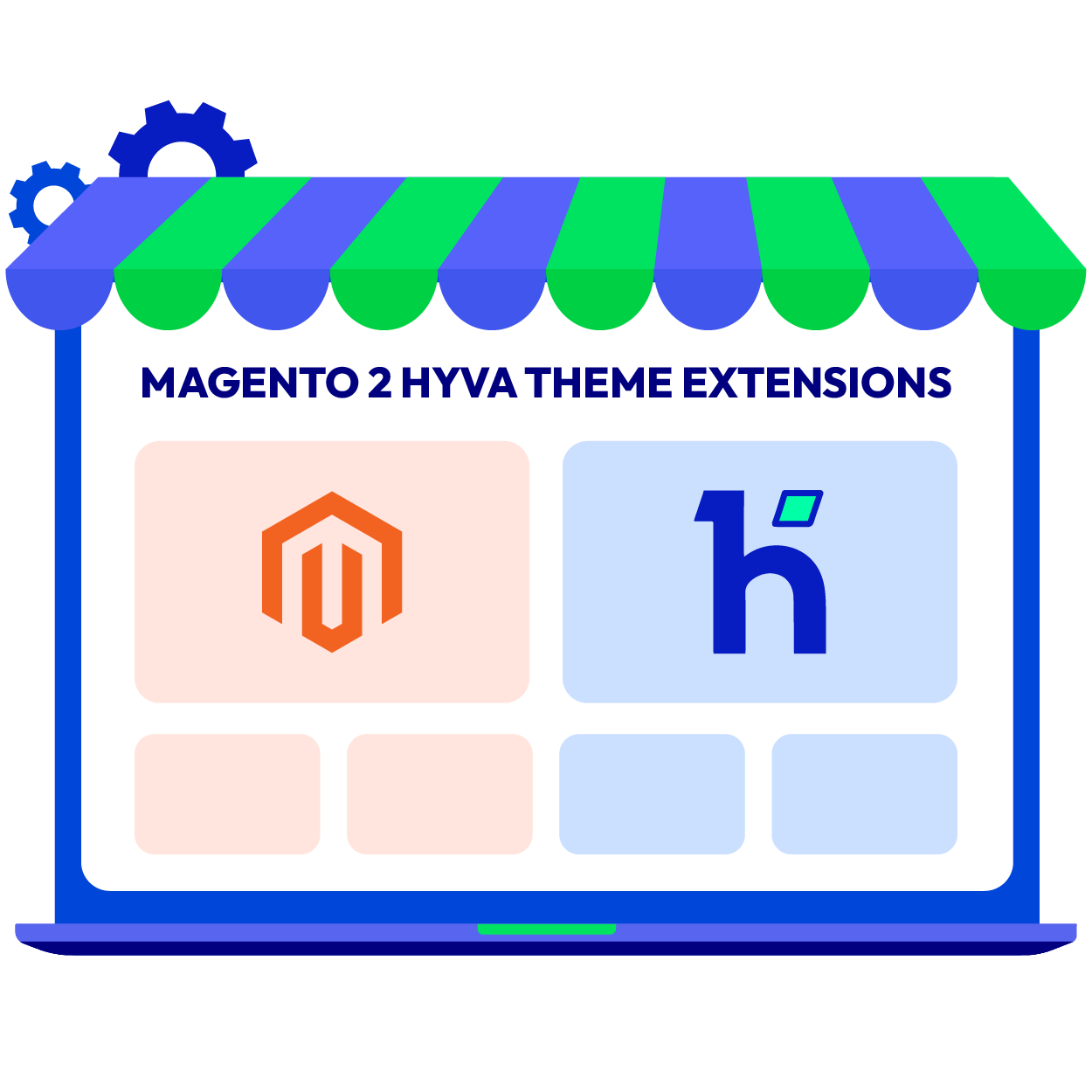
Magento 2 Hyva Theme Extensions
Transform your online store into a visual masterpiece with Magento 2 Hyva Theme Extensions – designed for captivating aesthetics and functionality.
Check it out!2. Porto
Version: Magento 1 & 2
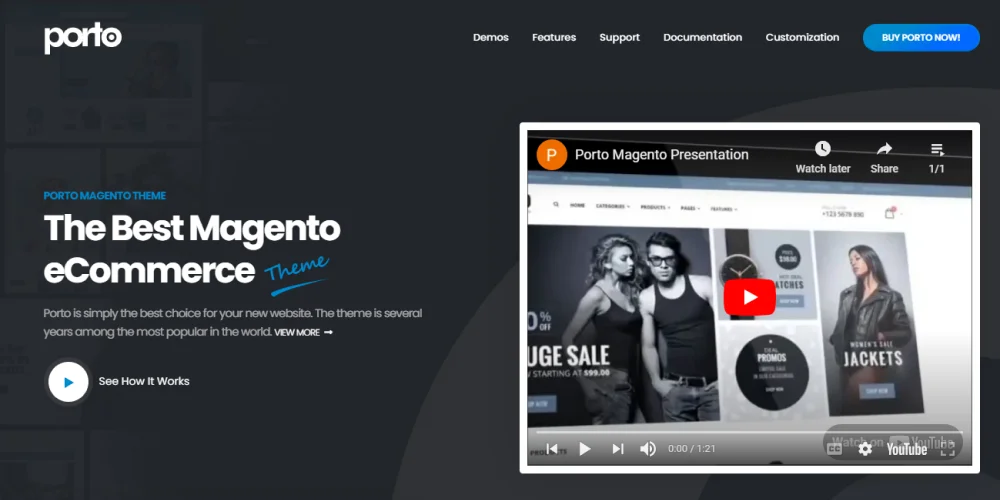
Since 2014, Porto has been one of the top-selling Magento themes (nearly 30K sales on Envato by now), featuring over 300 admin panels and extensive compatibility with various Magento extensions. It also boasts excellent support from the development team, making it a reliable choice for responsive design.
Key Features:
- Unlimited header layouts
- Easy customization
- Fully optimized and mobile-responsive design
- Compatible with major modules
- Quick view integrated
Price: $129
3. Fastest
Version: Magento 1 & 2
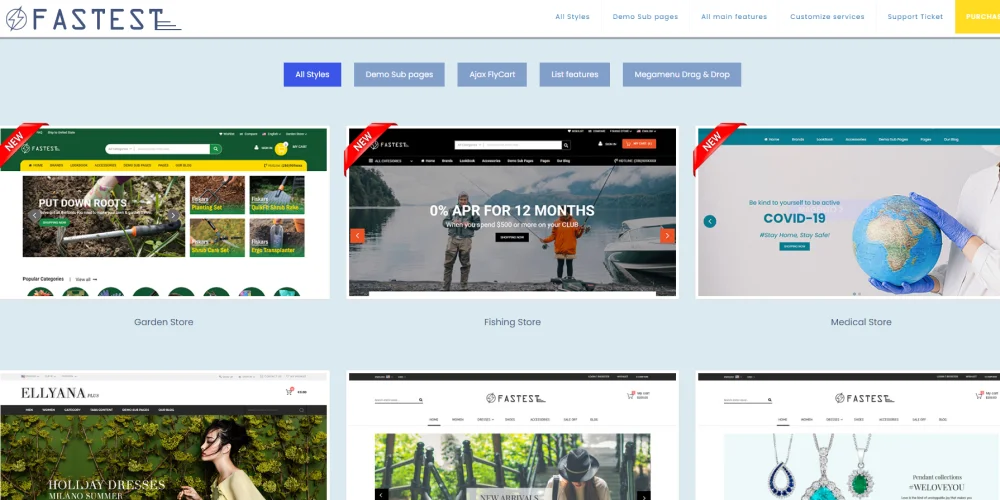
Fastest is another popular theme, offering a variety of demo layouts for creative freedom. It is fully responsive for mobile devices so that your store will look great on any screen.
Key Features:
- Ajax layered navigation
- Drag and drop builder
- Multiple layouts with diverse setting options for product and category pages
Price: $129
4. Martfury
Version: Magento 2
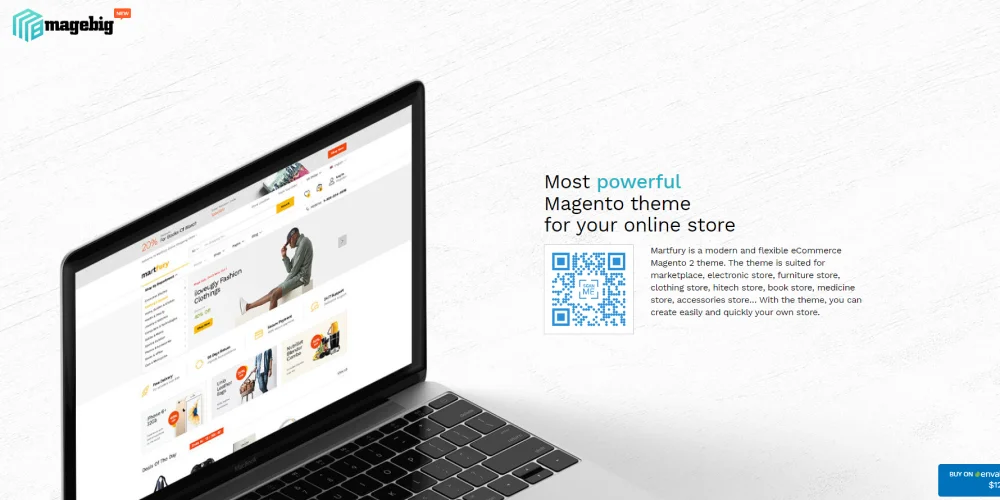 Martfury is an ideal theme for Magento marketplaces. It allows easy customization of your store’s appearance without the need for coding. This theme includes features like Elasticsearch, multi-vendor support, and multiple-store functionality, making it highly versatile and compatible with Magento 2.4.6.
Martfury is an ideal theme for Magento marketplaces. It allows easy customization of your store’s appearance without the need for coding. This theme includes features like Elasticsearch, multi-vendor support, and multiple-store functionality, making it highly versatile and compatible with Magento 2.4.6.
Key Features:
- Ajax search
- ElasticSuite compatibility
- Full support for Right-to-left languages
- Diverse color options
Price: $129
5. Claue
Version: Magento 1 & 2
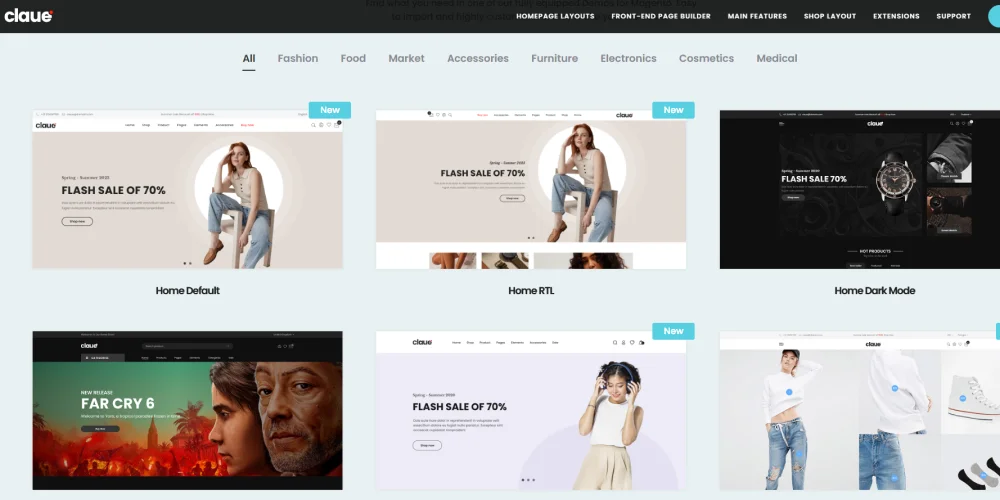
Claue is perfect for modern e-commerce stores, providing numerous layout options and support for blogs and portfolios. Built on the Bootstrap 3 framework, the theme includes features like Ajax cart and daily deals, making it a great choice for online retailers.
Key Features:
- 20+ homepage layouts
- Instagram shop integration
- 360-degree product view
Price: $99
6. Etrend lite
Version: Magento 2
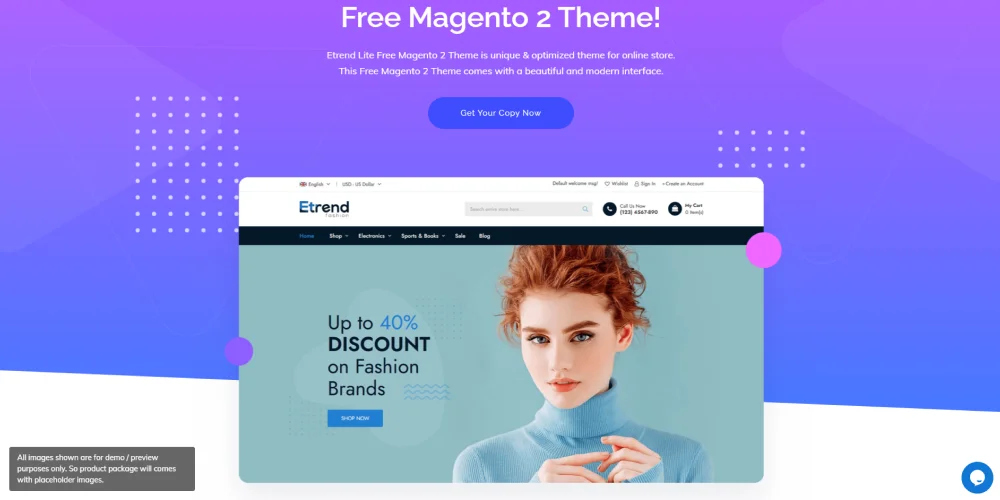
Etrend Lite is a free theme with a unique and modern design, ideal for various online stores. It is highly responsive across desktops, tablets, and mobile devices, capturing shoppers’ attention effortlessly.
Key Features:
- Multi-language support
- Cross-browser compatibility
- New & sale product labels
Price: Free
7. Tigrenpwa
Version: Magento 2.3.x – 2.4.x
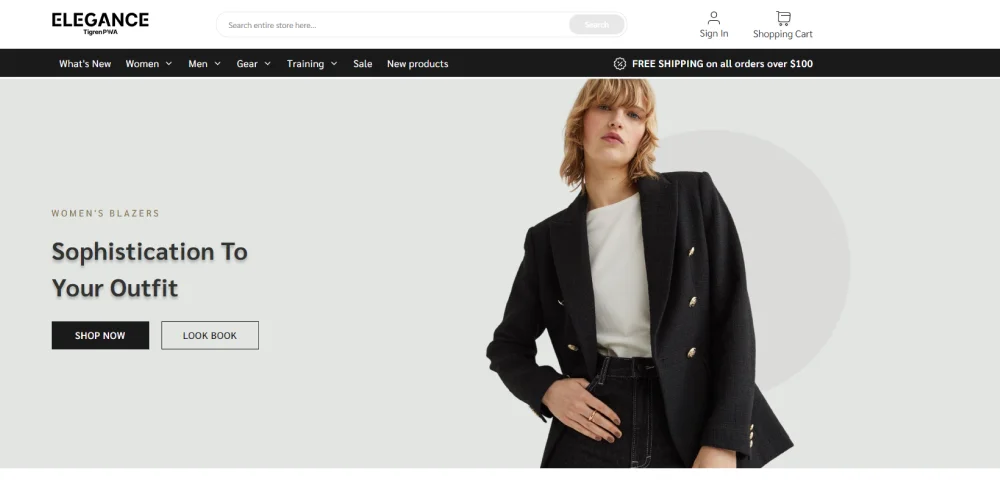
TigrenPWA offers a freemium version and is designed with PWA technology to enhance the user experience on mobile devices.
Key Features:
- Powerful APIs
- Good customer support
- Easy compatibility with extensions
Price:
- Free
- Lite: $399
- Pro: $799
- Premium: From $3,000
8. Infinit
Version: Magento 1 & 2
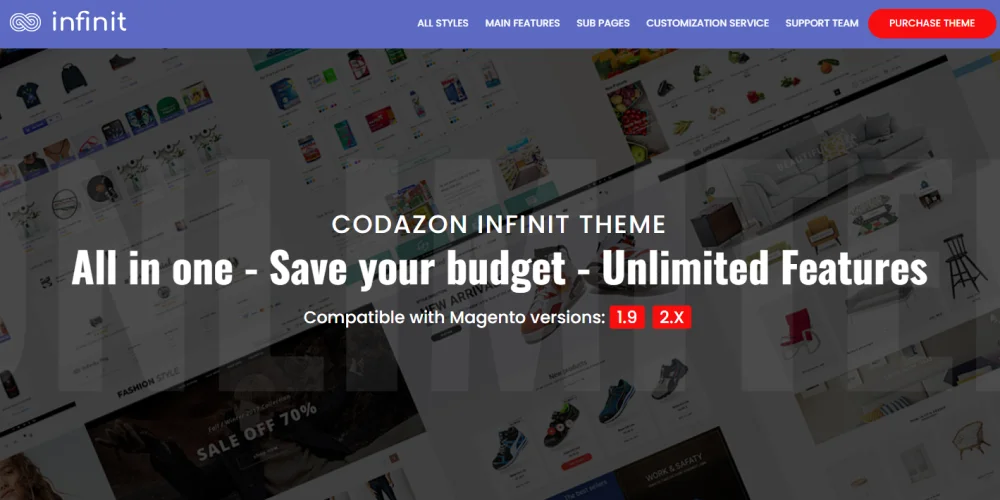
Infinit is perfect for creating a responsive website. It includes features like an OWL slider and custom product tabs, along with premium extensions at no extra cost, saving your budget.
Key Features:
- Flexible design
- Visual page builder
- 12+ header styles
- 13+ footer styles
- 20+ product list styles
- Fully responsive
Price: $129
9. Destino
Version: Magento 1.9 & 2
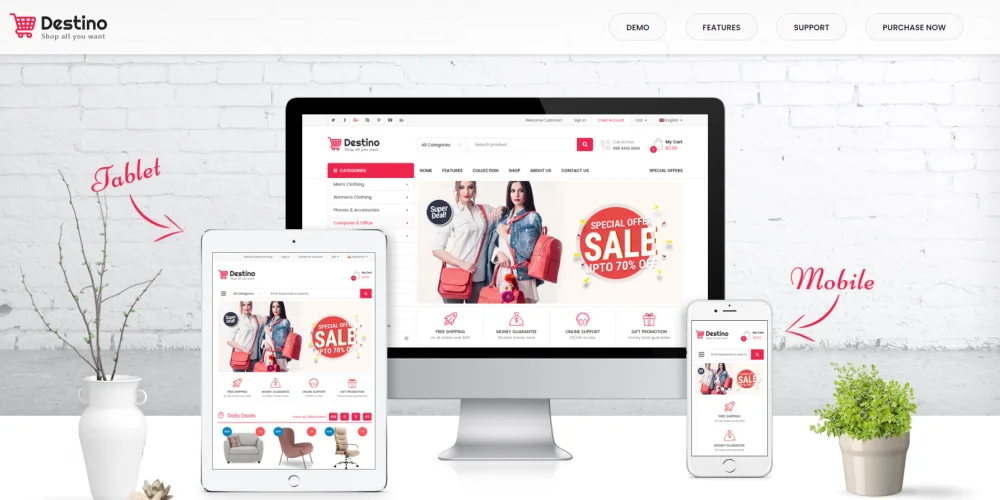
Destino is a clean, minimalistic theme well-suited for fashion, accessories, and furniture brands. Built with modern web technologies (Bootstrap 4, Font Awesome 4, LESS, CSS3, and HTML5), it provides a seamless experience for mobile shoppers.
Key Features:
- 14 different homepage layouts
- Fully responsive for PCs & mobile
- Supports six product profile types
- Compatible with Magento 2.4.7 (latest ver)
- Unlimited colors
Price: $79
10. Expert
Versions: Magento 2

Expert is a premium theme that is fully responsive and compatible with any Magento 2 store. It offers extensive customization options, making it suitable for various types of online shops.
Key Features:
- 13+ pre-made layouts
- 9+ multiple header options
- 9+ multiple footer options
- Unlimited color choices
- Easy-to-use admin panel
Price: $90
11. Milano
Versions: Magento 2
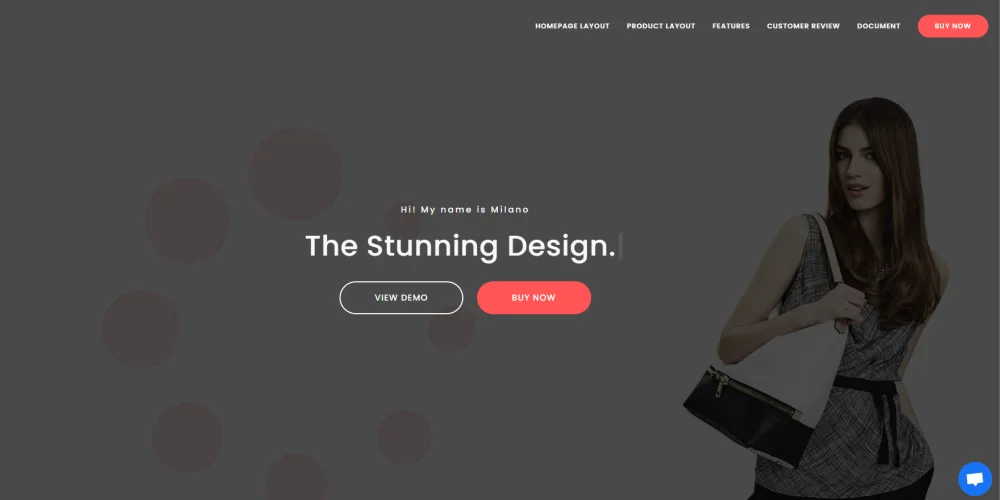
Milano is an excellent choice for those seeking a minimal and professional theme. It comes equipped with powerful slider banners, multiple layout support, and the ability to manage multiple currencies.
Key Features:
- Fully responsive design
- Easy customization without coding
- Unlimited color options
Price: $129
Who Can Use the Magento Default Theme?
Magento is popular for its open-source feature, allowing developers to easily customize templates, styles, layouts, and images.
The default themes, like Luma and Blank, are responsive and serve as good starting points for customization, enabling modifications to resources from modules or libraries.
You may wonder: Can anyone use the default Magento theme for a live store? Yes, there are no restrictions! For example, the Luma theme lets you add sample data with over 200 products, configurable with categories, promotional pricing, CMS pages, and banners.
If you want to customize the default design, it’s best to create a new theme. Magento advises against modifying the default Luma and Blank files, as any changes could be lost during upgrades.
Magento Themes Structure
In order to work with various areas of Magento theme layout effectively, a developer should understand the theme structure.
The Magento storefront themes are normally located under app/design/frontend/<Vendor>/. Additionally, these directory categories are considered sub-directories.
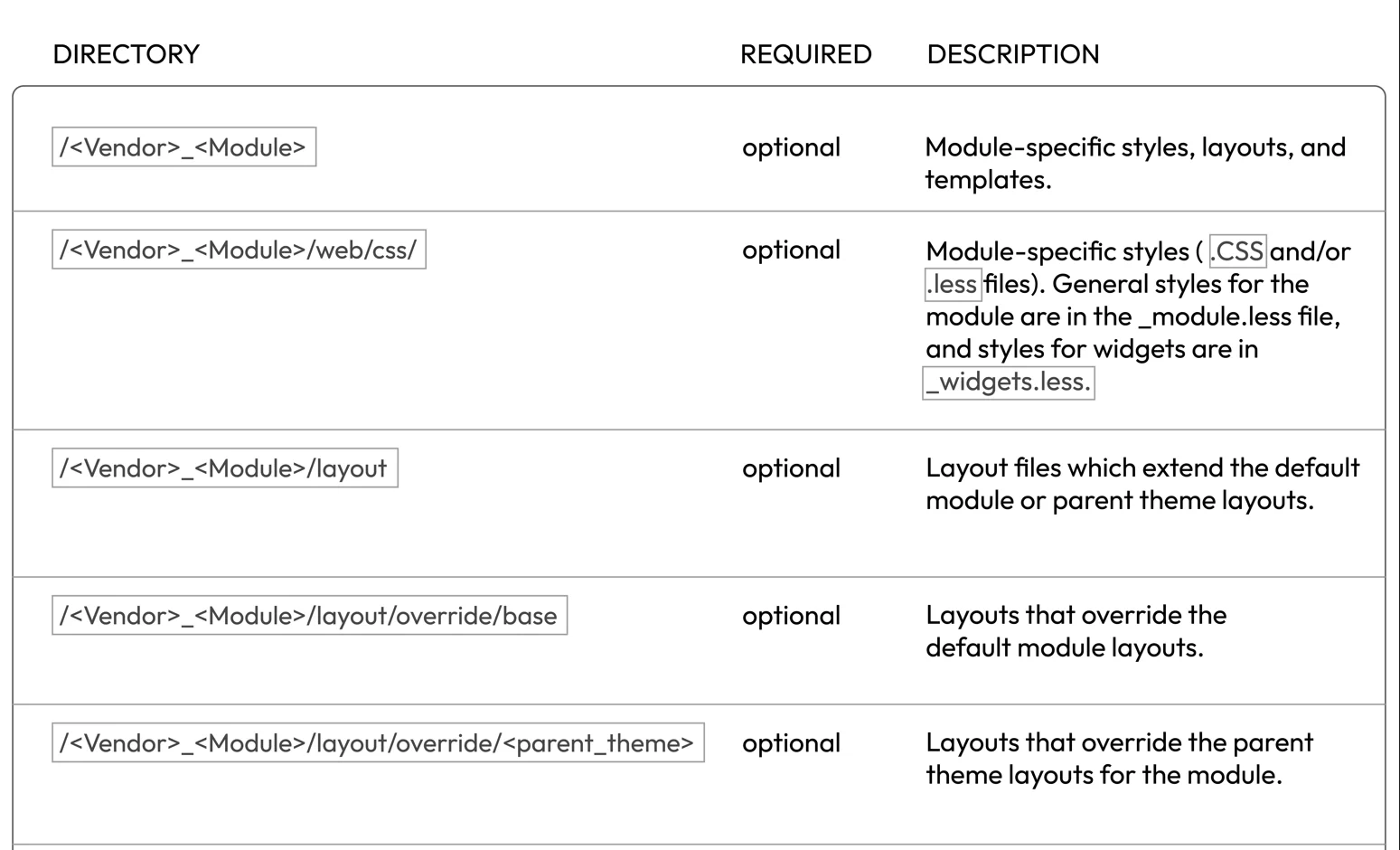
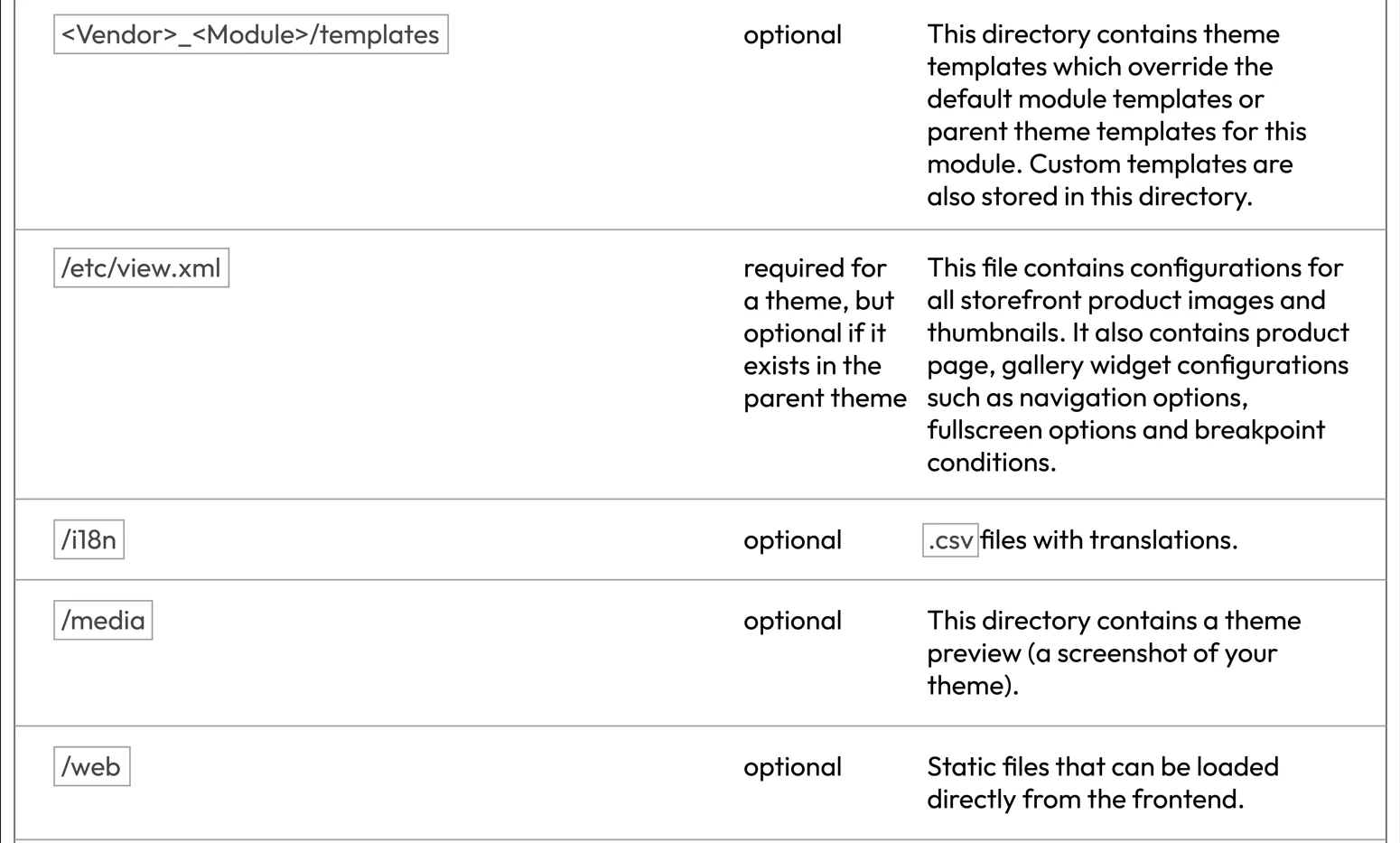
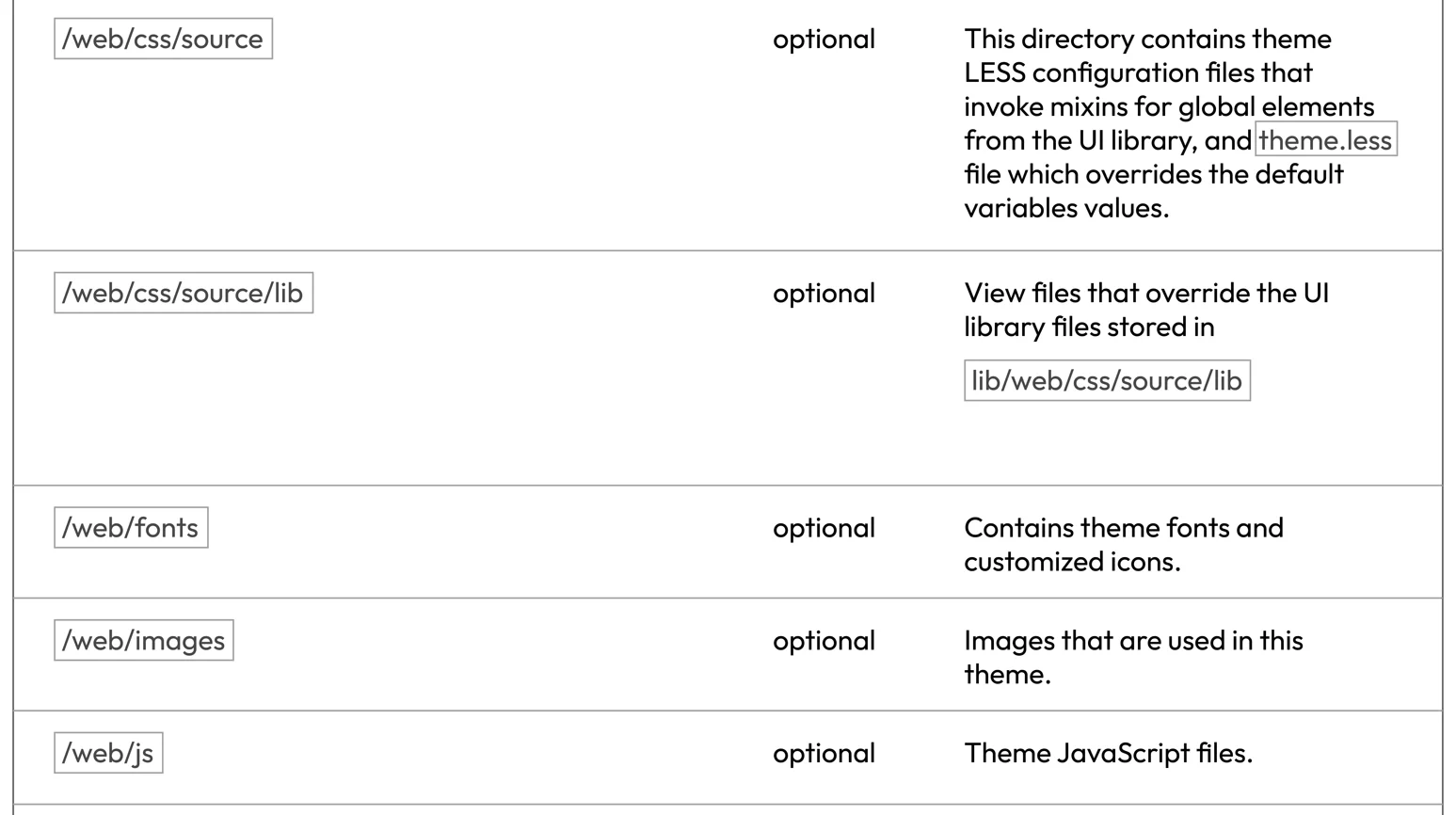
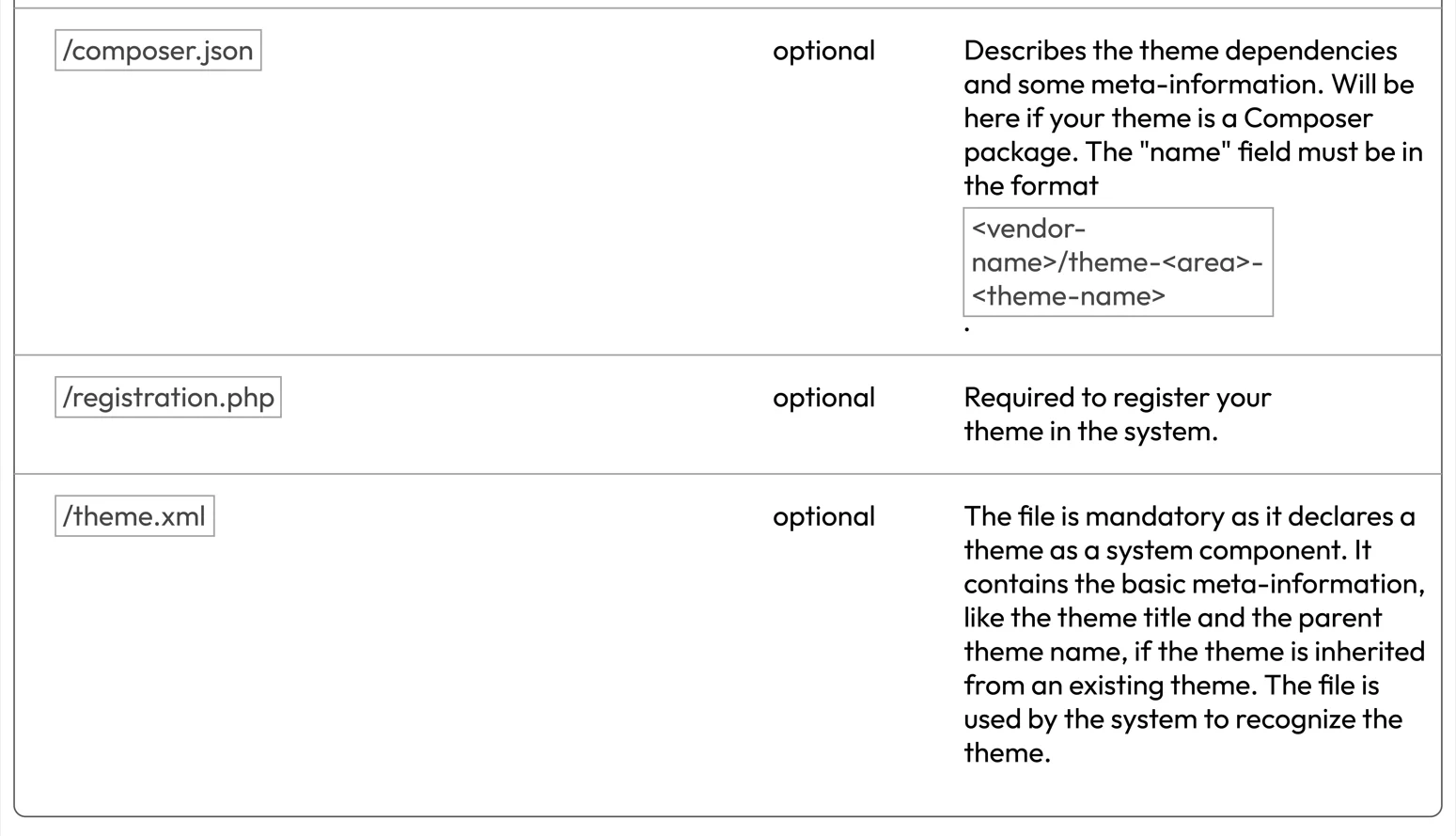
Wrap Up
When choosing a Magento theme, don’t just fall for its look. You need to consider other factors to see if it’s really a good match for your brand, like business goals, user-friendliness, SEO, etc.
If you don’t have much time, prioritize best-selling themes, but if you can, try to take a look at some new trending options in the list above; you may be surprised by their abilities.
Free 1-1 Consultation: Hyva Theme Development Service







